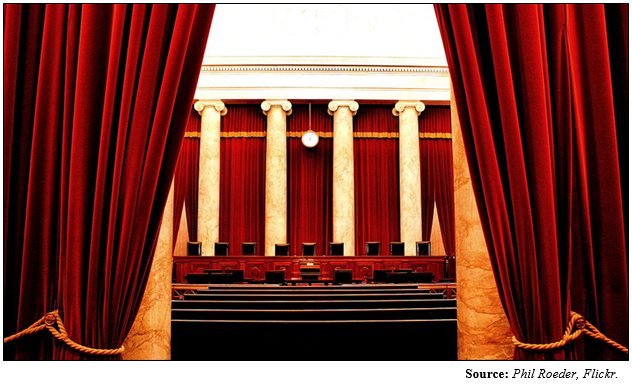One of the effects of the Senate impeachment’s abrupt conclusion in President Donald Trump’s favor is that the Republican Senate can get right on with the business of confirming constitutionalists to federal court, of which Trump recently touted 191 having been confirmed.
Since 1952, presidents have averaged 163 judges confirmed per term of office, which puts Trump well ahead of the game compared to other presidents. There are only 81 vacancies now, and 25 nominations pending, giving the President and Senate Majority Leader Mitch McConnell (R-Ky.) a clear window to get even more judges confirmed this year.
Now, almost 50.8 percent of current federal judges have been appointed by Democratic presidents — 404 to 390 — according to the latest data from the Federal Judicial Center.
Just consider that, to get to parity between the political parties on federal courts has taken three years of a Republican president, just to get it even. And even then, Republicans still don’t have a majority of judges, but they will soon.
If the remaining 81 vacancies are filled, that number will fall to 46 percent, giving Republicans 54 percent of federal judges.
Maybe that’s why Democrats wanted to slow down the Senate in 2020 with an endless impeachment trial. If Senate Democrats had had their way, the impeachment trial would be still be ongoing, with an endless parade of new witnesses to be called to occupy the Senate floor’s time — time not spent confirming judges and other executive branch appointments.
Take former National Security Advisor John Bolton’s prospective testimony. First, his lawyer said that he wouldn’t testify unless ordered to by a federal court while House proceedings were still ongoing. So Democrats didn’t bother to subpoena him.
House Speaker Nancy Pelosi (D-Calif.) then made a show of holding back Articles of Impeachment from the Senate until there was a pretrial agreement on witnesses. While that delayed the trial for about a week, it ultimately failed.
Then, Bolton’s lawyer turned around and suddenly said that Bolton would testify at the Senate trial if subpoenaed, a move designed to pressure Republican Senators to break with their party and hand the floor over to Senate Minority Leader Chuck Schumer (D-N.Y.), to call as many witnesses as possible, dragging on the trial for as long as possible to do maximum damage politically to President Trump.
Was Bolton’s testimony ploy coordinated? What we know is that the House never subpoenaed Bolton, and only after the House sent the Articles to the Senate did Bolton say he would testify if subpoenaed.
At that stage, Senate Republicans had a choice to make. Either allow the trial to continue indefinitely, harming Republicans politically because a few in their conference chose to extend the trial, or to just end it then and there. Mercifully for the nation, they opted for the latter.
Instead, the GOP Senate got its job done. No witnesses. And then a prompt acquittal for President Trump.
And now on to more judges.
It is worth noting that if a Republican House impeached a Democratic president with a Democratic Senate in power — say if this had been attempted in 2011 or 2012 — the charges would have been promptly, similarly defeated.
Meaning, the GOP Senate never had any good incentives politically to lengthen the trial, since there is zero likelihood they would be able to ever force a similar trial on a Democratic president in an election year when the roles were reversed. Particularly, when there are far more pressing matters from the Senate Majority Leader’s perspective, regardless of political party
McConnell did not want to waste months in 2020 on a Senate trial that would eventually acquit Trump anyway. As soon as he had the votes to end the trial, he did, and a clear majority of federal judges being appointed by Republican presidents before the end of the year will be his legacy.
Robert Romano is the Vice President of Public Policy at Americans for Limited Government.








